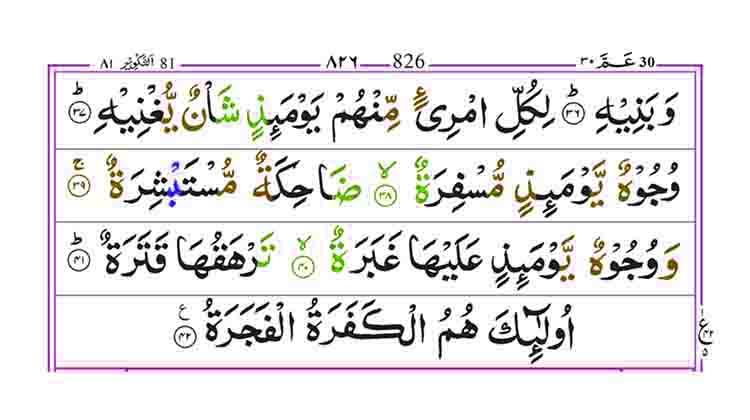Surah Abasa
Surah Abasa, the 80th chapter of the Quran, is a profound revelation that addresses themes of social justice, humility, and the consequences of turning away from divine guidance. Comprising 42 verses, this Surah serves as a poignant reminder of the importance of compassion, gratitude, and humility in the sight of Allah.
The central theme of Surah Abasa revolves around an incident involving the Prophet Muhammad (peace be upon him) and a blind man, Abdullah ibn Umm Maktum. The Surah begins by describing the Prophet’s interaction with some influential Quraysh leaders while Abdullah sought guidance. The Prophet’s unintentional neglect of Abdullah prompted this revelation, emphasizing the significance of treating everyone with respect and equality.
| Surah Abasa Ayats | Surah Abasa Words | Surah Abasa letters | Surah Abasa Rukus |
|---|---|---|---|
| 42 | 151 | 552 | 1 |
[wpdatatable id=7]



Reading Surah Abasa carries numerous benefits for believers. The Surah serves as a powerful reminder of the importance of social justice and the equal treatment of all individuals, regardless of their social status or physical abilities. It prompts individuals to reflect on their interactions with others, encouraging a spirit of humility and compassion.
A key benefit of Surah Abasa is its emphasis on the consequences of neglecting or turning away from divine guidance. The Surah recounts the incident as a lesson for believers, urging them to prioritize their relationship with Allah over worldly matters. It serves as a reminder that humility and attentiveness to divine guidance are crucial for spiritual growth.
Surah Abasa also serves as a source of inspiration for believers to cultivate gratitude and contentment. The Surah underscores the importance of recognizing Allah’s blessings and expressing gratitude for the guidance provided through the Quran.
Furthermore, the Surah encourages believers to seek refuge in Allah from the consequences of neglecting divine guidance. It underscores the role of humility and submission in attaining Allah’s mercy and guidance.
In conclusion, Surah Abasa is a chapter that addresses the themes of social justice, humility, and the consequences of neglecting divine guidance. Reading and reflecting upon its verses inspire believers to prioritize compassion, equality, and gratitude in their interactions with others. Surah Abasa stands as a timeless source of guidance, urging individuals to embrace humility and prioritize their relationship with Allah.
